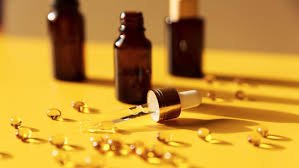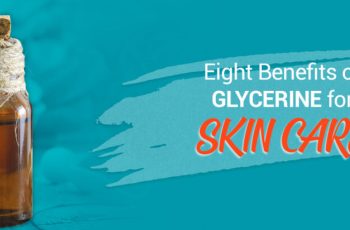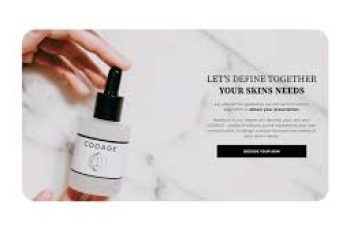
Vitamin E Oil Delivers Intensive Moisture to Dry Skin—Here’s Why Dermatologists Love It
Vitamin E is by no means new in the cosmetics industry. Once upon a time, it seemed like every teen magazine touted the ingredient as the solution to treating breakouts and healing acne scars. Additionally, the oil has been praised for its hydrating, antioxidant, and protective properties for skin and damage-repairing effects on hair. While we’re all for trying the latest and greatest products, there’s something to be said for sticking with old favorites.
For a quick recap of what vitamin E oil can do for your skin and how to incorporate it into your current beauty routine, we spoke with board-certified dermatologists Jennifer L. MacGregor, MD, Raymond Schep, MD, Lamees Hamdan, MD, and celebrity esthetician Renée Rouleau.
Read on to learn more about this dry-skin-saving ingredient.
Meet the Experts
Jennifer L. MacGregor, MD, is a board-certified dermatologist at Union Square Laser Dermatology in New York City.
Raymond Schep, MD, is the chief chemist at Colonial Dames Co. and a member of the California Association of Toxicologists.
Renée Rouleau is a renowned esthetician and founder of Renée Rouleau Skincare.
Lamees Hamdan, MD, is the CEO and founder of Shiffa.
What is Vitamin E?
“Vitamin E is an antioxidant vitamin and oil,” says McGregor. “It is often found in topical antioxidant blends or moisturizers.” In skincare products, vitamin E is usually found in oil or cream form.
Alpha-tocopherol (the form of vitamin E that humans can metabolize) is usually produced synthetically, but it is also found in natural products. Avocado, pumpkin, and wheat germ oils are all excellent sources of the vitamin, both for topical and internal use. 1
Vitamin E
Ingredient Type: Barrier Enhancer
Main Benefits: Locks in moisture, smoothes skin, antioxidant
Who should use it: Generally, anyone with dry skin. Vitamin E is not recommended for sensitive skin.
How often can you use it? : You should use vitamin E no more than once a day, preferably at night, as it’s often too thick to apply under makeup.
For: Vitamin C and ferulic acid
Do not use with: Retinol/Vitamin A2
Also, the form of vitamin E you get is important: “Synthetic vitamin E is made up of eight different forms, only one of which is identical to the natural molecule. “As a result, studies have shown that natural vitamin E is at least twice as potent as synthetic vitamin E,” explains Schep. “It’s also used in cosmetics as tocopheryl acetate. [Since] natural D-alpha-tocopherol is about eight times more expensive than synthetic vitamin E, the synthetic form is often used in cosmetics, especially in high-potency products. Additionally, natural vitamin E must go through multiple processing steps to remove pesticides and herbicides, all of which may not be completely removed. Synthetic vitamin E does not have this disadvantage.”
Benefits of Vitamin E for Dry Skin
Protects the lipid barrier: “Vitamin E keeps the lipids in the skin fresh,” explains Rouleau. “This helps keep the skin’s protective barrier intact.” [Keeping them intact] can help seal small breaks in the skin barrier that allow moisture to escape, making the skin feel tight and dry. ”
Keep skin moisturized: Additionally, vitamin E can hold moisture between skin cells for much longer than products without vitamin E.2 According to Rouleau, it moisturizes for up to 16 hours.
Heal skin: Schep explains why vitamin E is so popular: “The main benefit of vitamin E is its ability to speed up the healing of skin injuries, such as burns and wounds, by up to 50 percent. It’s an antioxidant, which can heal the skin after sunburn and any form of irritation and injury. It also increases the moisture content of the skin. Therefore, it has an anti-aging effect on the skin.”
It’s an antioxidant: Vitamin E also has antioxidant (fat-soluble) benefits—it helps neutralize harmful free radicals and, due to its antioxidant effects, can prevent sebum (oil) from oxidizing, which can prevent blackheads.2 “The word ‘anti’ means antioxidant,” Rouleau points out. “When the hardened and clogged oil tops in pores turn dark due to oxidation, vitamin E can help slow this process.”
Soothes skin: Formulas with vitamin E pamper skin that’s been stressed by environmental stress. 2 The ingredient smooths skin and leaves it feeling comfortable after irritation caused by acne, pollution, and sun damage.
Sunscreen: Vitamin E also has photoprotective properties. 3 “When vitamin E is combined with vitamin C and used under sunscreen, it can provide four times more protection than sunscreen alone,” says Rouleau.
Possible side effects of vitamin E
“When vitamin E is applied directly to the skin in pure form in capsule form, it can cause a dermatitis-like reaction, especially in areas where the skin is thinner and more sensitive, such as the skin around the eyes,” warns Rouleau. If you’ve ever had dermatitis (the technical term for skin inflammation) caused by a skincare product, you know it’s not a good idea to use a patch to treat the dermatitis in that area without first testing it before applying.
Vitamin E is also considered comedogenic, meaning it can clog pores and eventually lead to acne. Therefore, it may cause worsening symptoms in those who are prone to acne and pimples. If you notice any changes in your skin after using vitamin E, consult a trusted dermatologist.
Oral supplements vs. topical vitamin E
Vitamin E is naturally found in a variety of foods, and although we need more as we age, most people don’t need to supplement. Topical vitamin E is found in many skin care products and is not only a safer alternative, but also suitable for spot treatments on specific skin areas. Some people prefer to extract the vitamin E from a supplement capsule and apply it directly to the skin for a high concentration, but this can cause allergies and lead to unwanted side effects such as irritation. If you are considering taking an oral supplement, talk to your doctor first, as vitamin E can interfere with the effects of medications.
Application
“If you want to treat a specific scar or area, open a vitamin E capsule and apply the oil to the area for a few weeks,” Hamdan advises. “It’s an excellent antioxidant, and its ability to prevent premature aging has been extensively studied. That’s one reason why I prefer vitamin E as part of an oil rather than pure vitamin E, which is usually the alpha-tocopherol version of vitamin E. If you have sensitive skin, you can still use it—just a small amount and pat it in gently. If you get a rash or redness, that may be a sign that your skin isn’t used to it.”
As for concerns about comedogenicity, “It’s important to note that vitamin E concentrations in skincare formulas are very low,” says Rouleau. This method of use is a far cry from opening a capsule and using the ingredient in its pure form. “It may have been diluted enough that it wouldn’t be a problem.
However, when looking at a product’s ingredient list, it’s hard to know the purity level or how your skin will react to it. But this applies to every ingredient used in every product. Rouleau says it’s best to do a patch test when buying a new product.
Final Verdict
Vitamin E oil is a powerful antioxidant found in skin care and beauty products. It can help fight the effects of free radicals, which can cause skin aging and damage. Vitamin E also has anti-inflammatory properties that can soothe and calm the skin, helping to treat conditions like acne and dryness. Additionally, it can help lock in moisture and keep the skin hydrated, which helps boost the skin’s natural barrier function. If you want to reap the benefits of vitamin E for your skin, it’s best to apply it topically. Vitamin E can clog pores and trigger breakouts, especially for people with acne-prone skin. If you notice changes in your skin after using vitamin E, consult a dermatologist.


